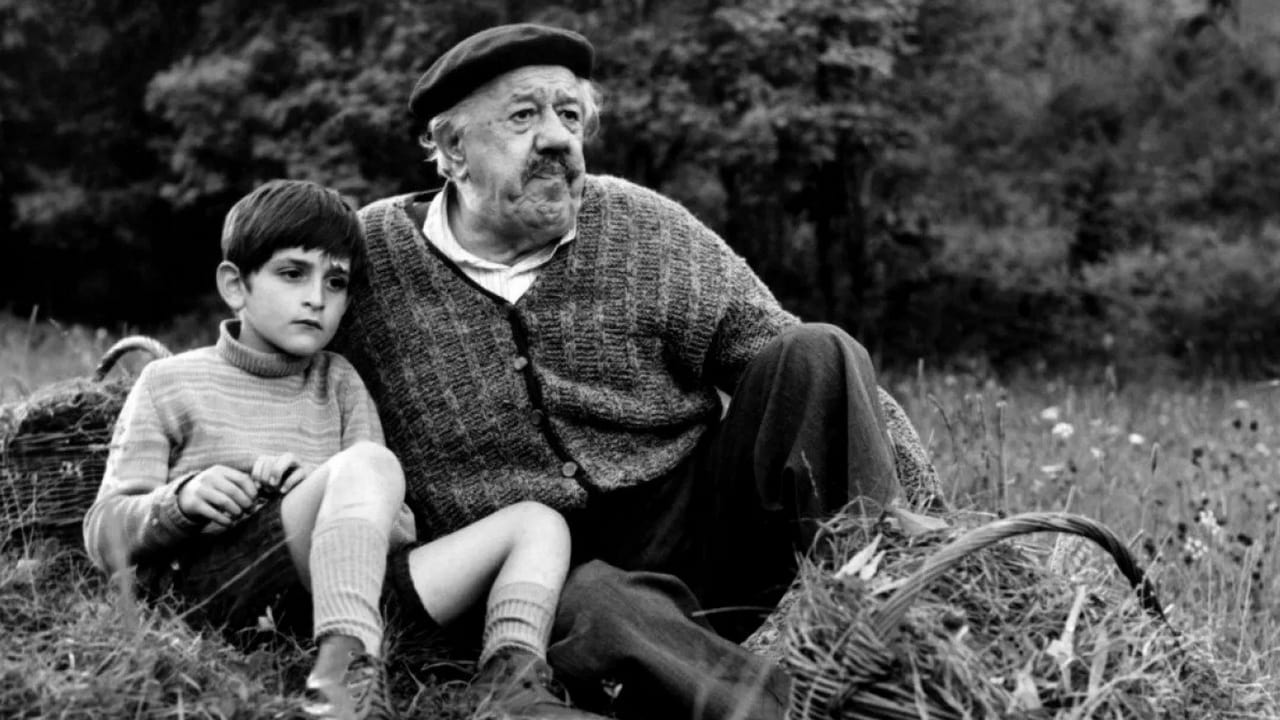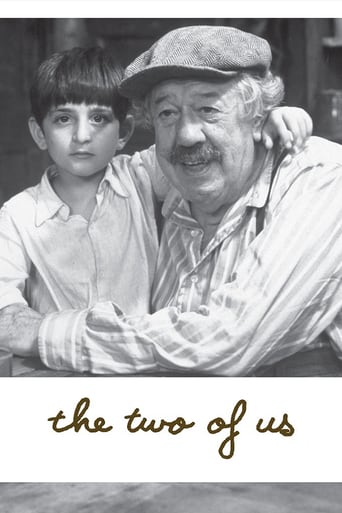

This is a charming movie set in the backdrop of war while carefully avoiding much of the asperity of war. It focuses on the relationship of a young boy and his adopted septuagenarian "Grampa", Pepe.Claude is a nine year old Jewish boy. He is bright and mischievous, as young boys are. His parents move from place to place in occupied France to avoid being detected. Claude is continually bringing unwanted attention to himself and his desperate parents. They decide to send him to stay with the parents of a trusted Catholic friend. Enter Pepe, Michel Simon.Pepe is an old rogue, full of half-baked political opinions, always babbling some truculent platitude or other. He's not too bright but he's a complex character, warm and charming. We see him feeding his 15 year old pet dog from a plate with a spoon. The dog wears a bib. This is a soulful old man, despite his vitriol. Pepe immediately takes to Claude and begins to educate him about the evils of France's 'natural enemies': the Germans, the English, the Freemasons, the Bolsheviks and the Jews. But ultimately, it is Claude who educates Pepe.The relationship develops and we see that Claude finds more enjoyment with Pepe than he does with village kids. Unlike his time with his parents, Claude behaves himself well. He helps Pepe with chores. They play games together. The two are inseparable. Rather than joining the village ruffians, Claude is their victim and runs home to the protection of Pepe. The old man supplies something that Claude did not get at home, despite Claude's affection for his parents.Claude very cleverly runs rings around Pepe, showing the nonsense of his claims about the Jews. This is quite amusing. Claude moans that he must be a Jew, according to the description Pepe gives. Pepe comforts him, "no, of course you are not." Then Claude strikes back, accusing Pepe of being a Jew, with his big nose and curly hair. Pepe stands before the mirror, examining himself forlornly. We can see that Pepe is slowly coming to realize the folly of the clap-trap he has been espousing.Pepe is too lovable a fellow to really hate his enemies, who are mere phantoms. He clings to his opinions out of habit rather than conviction. Pepe grumbles when the local priest delivers a sermon advocating compassion to the oppressed. But grumbling is about the extent of Pepe's bigotry. Claude teases Pepe that after the war the Jews will probably come back to power. Pepe dismisses the observation with the remark, "Oh well, they're probably no worse than the rest of them." Claude has worn the old bigot down.Claude never reveals that he is a Jew. One of the reviewers above thought that this non-revelation meant that the film never resolved. I disagree. One of the strengths of the film is that it doesn't follow a formulaic structure. It is not full of clichés. A revelation scene would lend itself to cliché.The movie makes its point eloquently, without such clichés: bigotry is a vapid habit of belief and love is a more powerful force than hatred. What more need be said?
... View MoreClaude Berri has been gracing French cinema as Producer, Writer, Actor and Director for several years and it's a given that at least two or three of his movies are on every discerning viewer's 'Best' list and I don't necessarily mean the obvious, i.e. Jean de Florette and its other half Manon but things like Lucie Aubrac which is also set in Occupied France as is this gem. The idea of teaming a Senior Citizen with a child is far from new and far from played out, witness Papillon less than a decade ago, but it is, by definition, tricky and the trick is in finding a suitable child. Berri struck oil with Alain Cohen and all he had to do was pair him with Michel Simon and the movie practically made itself. That, of course, is the impression an audience gets when a master filmmaker like Berri is on bullhorn. I can add little to the praise, merely second it. A great movie.
... View MoreI remember seeing this movie when I as a teenager (say, about 1970) and I was then very moved by this warm and tender drama. Nearly 30 years later, I just saw it on TV and I didn't change my mind : this is a very good movie, in the way French can say a lot of things in this kind of day-to-day film. The chemistry between young Cohen and veteran Simon is beautiful. It's also filled with references to the way people in France lived the Second world war, like Simon hating Jews and didn't know that is young friend Berry is a Jew. I love Michel Simon. He had been such a great actor from the second half of the 1920's to his death, in the middle 1970's. He was always good in his films, so natural that we don't think he's acting. Le vieil homme et l'enfant is a very intelligent movie for young director Berri, who will be famous as a director and producer in the next years.
... View MoreCute. Tender and somewhat kitch. A showcase for 72 years old Michel Simon, an important Swiss actor of silent and early talking films. Double bill with Sound of Music. They go well together with war, kids, frightening adults and tender moments. A film for the church lady.
... View More